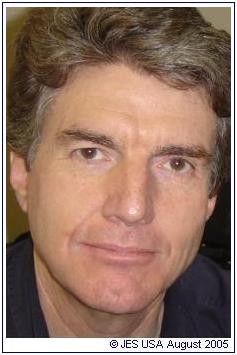October 06, 2006
Armstrong's abbreviated article: Peter Shann Ford responds
 In response to our postings on his argument
that Neil Armstrong said "small step for *a* man", Peter Shann Ford
sent an email, which, with his permission, I include in full and
unedited form below the fold. (Editing the message would reduce
transparency, he points out.)
In response to our postings on his argument
that Neil Armstrong said "small step for *a* man", Peter Shann Ford
sent an email, which, with his permission, I include in full and
unedited form below the fold. (Editing the message would reduce
transparency, he points out.)In case you need to catch up, here are our postings so far on the issue, it being typical of linguists that the smaller the word, the more we have to say about it:
One small step backwards
One 75-millisecond step before a "man"
Armstrong's abbreviated article: the smoking gun?
Armstrong's abbreviated article: notes from the expert
First Korean on the moon!
What Neil Armstrong said
Email from Peter Shann Ford, October 6, 2006:
Dear Professor Beaver Professor Hansen was kind enough to forward me your links, and I've just read them. It's very good that someone with your specialized expertise has turned his attention to this. As you'll see in the paper, I've made full revelation and attribution regarding the GoldWave software used to analyze the NASA WAV file, full annotation of the UMD oral diagrams including its specific URL (www.wam.umd.edu) and full revelation of my own background - no more, no less. I'm certain your academic analyses would typically be empirical and free of anything but focus on the subject, and I look forward to discussing the sound file with you if you like. In fact as I've discussed with Jim Hansen, if more professional academics enter this amiable discussion with a proper level of skepticism and expertise, we'll more efficiently see if this holds up. I agree with your inference that whatever linguistic, physiological and signal analyses are brought to bear on this can only be productive in verifying or refuting the presence of the elusive "a". Of course you'll appreciate from Jim's excellent biography, "First Man" that authorship and intent regarding the sentence reside in the same person: Neil Armstrong's recollection to Jim was that he composed the sentence, "That's one small step for a man, one giant leap for mankind" and fully intended to say "for a man" when he stepped onto the surface, and given the precision with which he did everything else on his agenda that day, it's reasonable to believe him. Regarding the oral graphics: having studied English, Russian and Mandarin (I claim to speak none of them better than appallingly, even after more than a decade of voice coaching), I understand that there are certainly measurable differences in the way speakers of each language develop physiologically from their formative years to maturity: people with almost identical physical characteristics at birth - as you will know better than most - exhibit palatal development, from childhood to adulthood if their primary language is Mandarin, that is discernibly different from those whose primary language is Russian: similar distinctions may be suggested for primary speakers of German, French and Yankuntjatjara (a language spoken in the central desert of Australia). However the diagrams - I imagine you'll agree - are of a scale and style that cannot pretend to demonstrate these distinctions with any level of necessary subtlety and nuance. Rather they show the general relevant positions of the lips, tongue and mandible (and the colored arrows indicate the basic directions of lingual and labial movement) during the transition from the "r" in "for" to the "m" in "man" if the speaker intends to say "for man" or "for a man". With great respect to you, the fact that the original three diagrams were used on a Korean subject site on the UMD web, viz. Workstations at Maryland, do not seem from this perspective to be relevant; though I am more than willing to be logically persuaded by you if you disagree. The best part of these discussions would be for academics to bring their formidable knowledge and wisdom to bear on this in concert with any amateurs who believe - like so many amateurs through history who stumbled upon a truth that was later verified with greater erudition by superior intellects - that on July 20 1969, one man did what we all dreamed of doing, and like the iconic hero of Joseph Campbell's empirical journey, did it for us, took the risk for us, and in those now immortal words, spoke for us - completely, and correctly. My belief based on the sound file and supported by Neil Armstrong's own account to Prof. Hansen is that he did; my hope is that you are successful in helping to confirm, with far greater acuity and sagacity, that he did indeed say what he meant to that day. I look forward to your thoughts. Kind regards Peter |
Peter's thoughtful message is much appreciated. I don't know whether we linguists can live up to our billing as acute and sagacious. (I thought Saga City was just a town in Japan.) But resolving the issue of the missing "a" is the sort of teaser that gives linguists inexplicable pleasure, so it's worth a crack. If any phoneticians out there have some relevant insights, please let us know!
Posted by David Beaver at October 6, 2006 12:34 PM